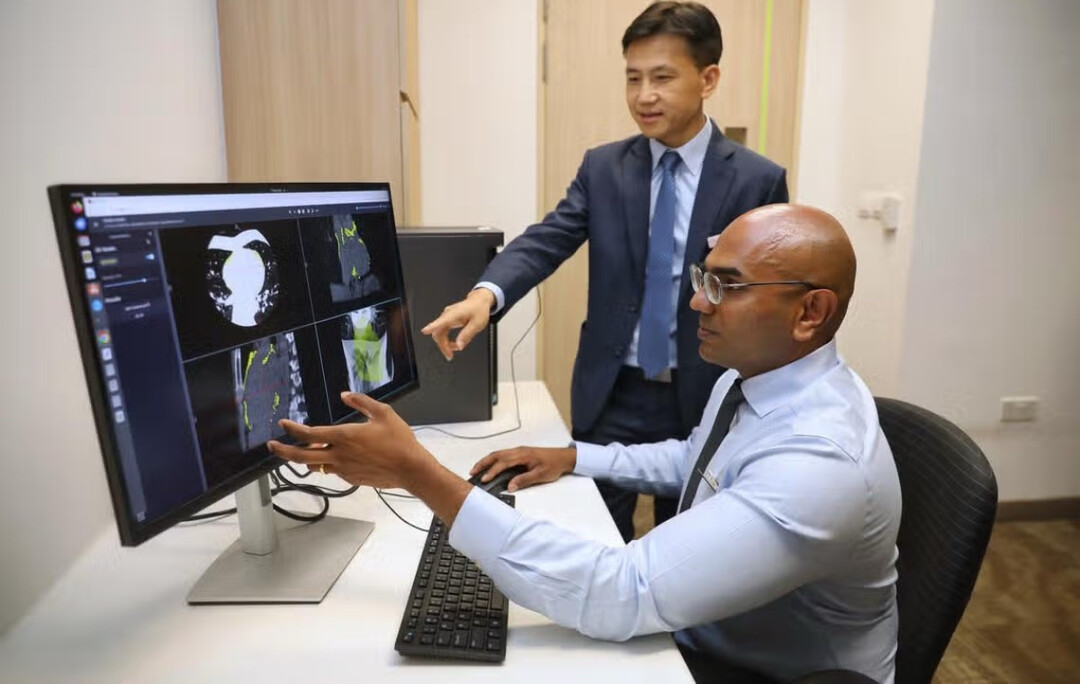
Singapore – Singapore is ushering in a new era of healthcare, leveraging artificial intelligence (AI) to dramatically shorten cardiovascular disease diagnosis times and contribute to saving patients' lives. The National Heart Centre Singapore (NHCS) announced on May 20 its plan to pilot an AI system across three public hospitals. The goal is to significantly reduce the time needed for cardiac scan analysis, enabling faster diagnosis of coronary artery disease.
'Singapore Heart Lesion Analyzer' Pilot Program Imminent
The AI system to be introduced is named the 'Singapore Heart Lesion Analyzer.' It is set to commence its pilot operation from the third quarter of 2025, marking a significant turning point in the full integration of AI technology into Singapore's healthcare system.
According to Dr. Lohendran Baskaran, a consultant at NHCS, the current process of interpreting cardiac imaging scans and assessing coronary artery disease risk, which takes radiologists and cardiologists 2 to 4 hours, will be shortened to under 10 minutes with this AI system. This will play a crucial role in significantly reducing diagnosis waiting times, ensuring patients receive timely and necessary treatment. The introduction of the AI system is particularly meaningful given that in emergency situations, diagnosis speed can be directly linked to a patient's life.
Dr. Baskaran emphasized, "The AI system will rapidly and accurately analyze complex medical imaging data, assisting medical professionals in diagnosis and ultimately contributing to increased efficiency in patient care." He added, "This is not just about saving time; it will also have a positive impact on the efficient allocation of medical resources and improved patient satisfaction."
High Accuracy of 85% to 99% Proven, Now Undergoing Real-World Clinical Validation
This AI system has demonstrated high accuracy, ranging from 85% to 99%, in controlled environments. This suggests that the AI can detect subtle changes in cardiac images and identify signs of disease with accuracy comparable to, or even exceeding, that of experienced medical professionals. Such high accuracy demonstrates the potential for the AI system to be used as a reliable diagnostic tool in real clinical settings.
The pilot operation, which will run for the next year, will focus on evaluating how well the AI system performs in actual clinical environments. During the pilot, various aspects will be thoroughly reviewed, including system performance, interoperability with medical staff, patient safety, and satisfaction. If successful, there is a high likelihood of expanding its use to other hospitals across Singapore.
Coronary Artery Disease: Singapore's Leading Cause of Death
Coronary artery disease is the primary cause of cardiovascular-related deaths in Singapore. In 2023, a total of 8,311 people died from cardiovascular diseases in Singapore, accounting for approximately 30% of all deaths that year. These statistics clearly highlight the critical importance of early diagnosis and prompt treatment for coronary artery disease.
Coronary artery disease is a condition where the coronary arteries, which supply blood to the heart, narrow or become blocked, potentially leading to angina or myocardial infarction. If not detected early and treated appropriately, it can lead to severe complications or even death. Therefore, shortening diagnosis time is a crucial factor in determining patient prognosis.
Global Trend of AI Adoption in Healthcare and Singapore's Leadership
Singapore's adoption of this AI system reflects the global trend of utilizing AI technology in the healthcare sector. In developed countries like the United States and Europe, active research, development, and commercialization are already underway in various areas, including AI-assisted diagnostic systems, personalized treatment planning, and new drug discovery.
Particularly, the field of medical imaging diagnosis is one of the areas where AI's strengths are most pronounced. AI excels at learning from vast amounts of medical images to identify subtle patterns or abnormal signs. This can help detect aspects that even skilled medical professionals might miss, improving diagnostic accuracy and reducing the fatigue of healthcare providers.
Singapore has proactively pursued its Smart Nation strategy and has actively incorporated advanced technologies into its healthcare sector. This pilot operation of the AI heart diagnosis system exemplifies Singapore's commitment to positioning itself as a global leader in digital healthcare. The Ministry of Health Singapore expects AI technology to play a pivotal role in improving the quality of healthcare services and promoting public health.
Challenges and Future Outlook of AI Medical Systems
Of course, the introduction of AI medical systems also presents several challenges. The most critical concerns are data security and personal information protection. Thorough preparation is needed for potential security threats that may arise during the process of training and utilizing sensitive patient medical data with AI systems. Furthermore, the issue of accountability for AI-generated diagnostic results is also a crucial topic for discussion. A clear principle must be established that AI is merely an auxiliary tool, and the final diagnosis and treatment decisions rest with medical professionals.
From an ethical standpoint, AI medical systems have many aspects to consider. Issues such as algorithmic bias, meaning the possibility of diagnostic imbalances due to a lack of data for specific ethnic groups or age ranges, may arise. To address this, efforts are needed to train AI systems on diverse population data, and ethical guidelines must be strictly adhered to from the AI system's design stage.
However, despite these challenges, the positive ripple effects that AI will bring to the healthcare sector are expected to be substantial. From improved diagnostic efficiency and expanded access to healthcare to advancements in personalized treatment, AI has the potential to transform the paradigm of medical services. Singapore's pilot operation will be a significant step towards this future. It is hoped that this system will successfully establish itself, saving more lives and contributing to improving the quality of life for patients.
[Copyright (c) Global Economic Times. All Rights Reserved.]






























